Unit 1 Friendship learning about language
文档属性
| 名称 | Unit 1 Friendship learning about language | 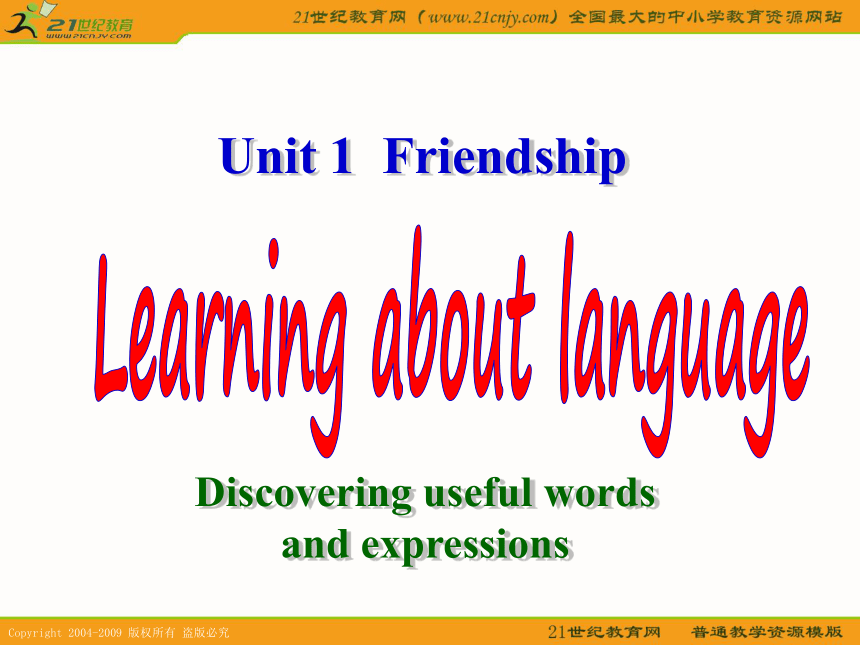 | |
| 格式 | rar | ||
| 文件大小 | 307.2KB | ||
| 资源类型 | 教案 | ||
| 版本资源 | 人教版(新课程标准) | ||
| 科目 | 英语 | ||
| 更新时间 | 2011-01-04 10:22:00 | ||
图片预览

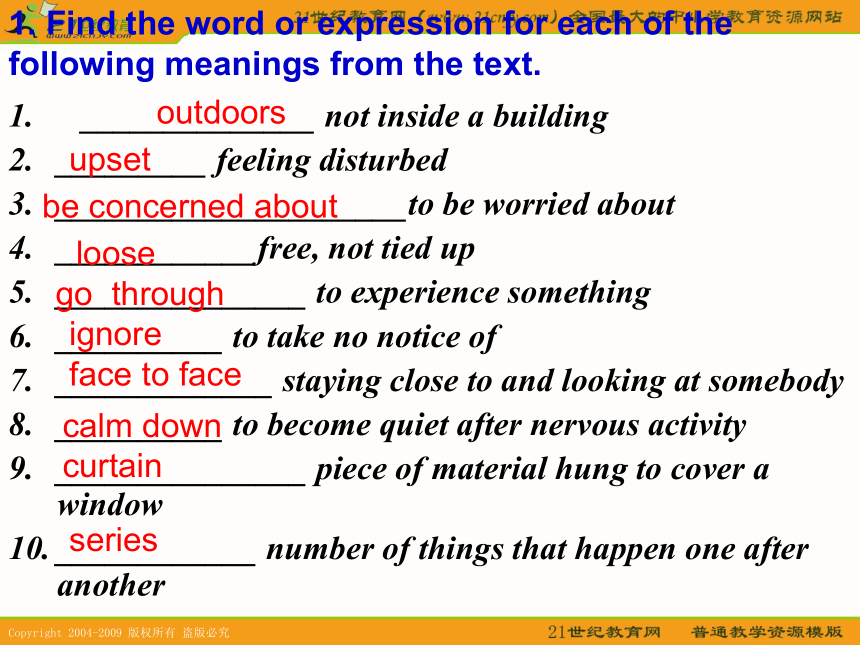
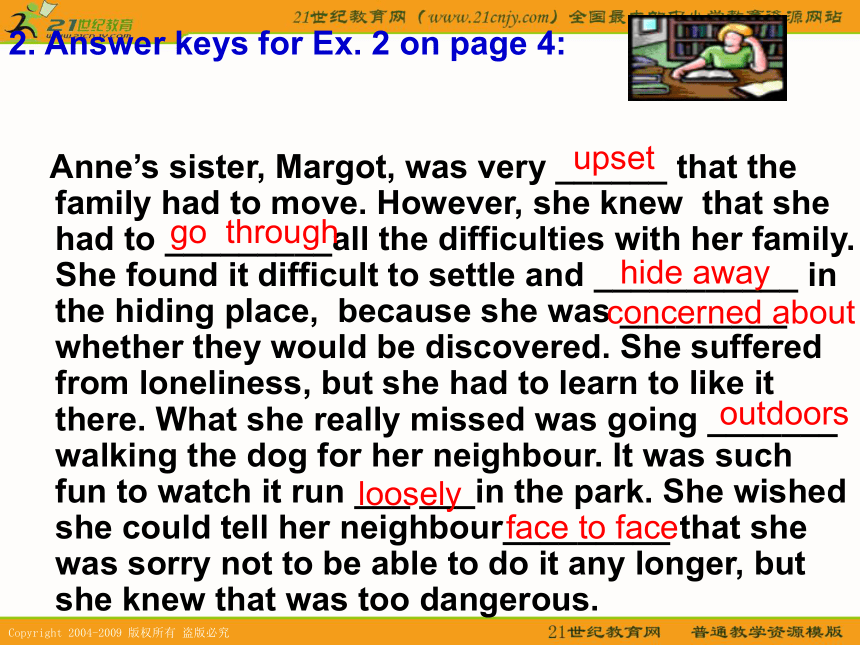
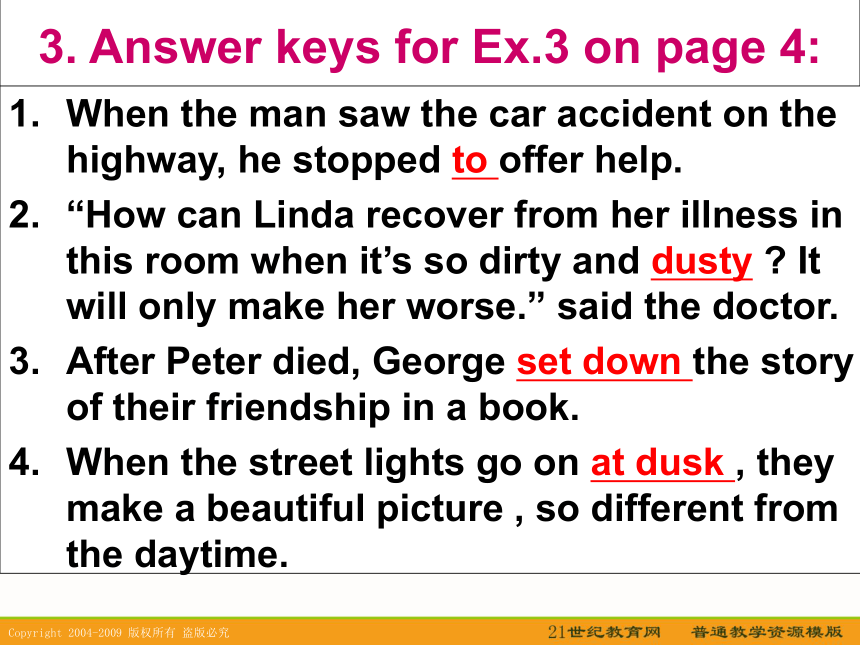

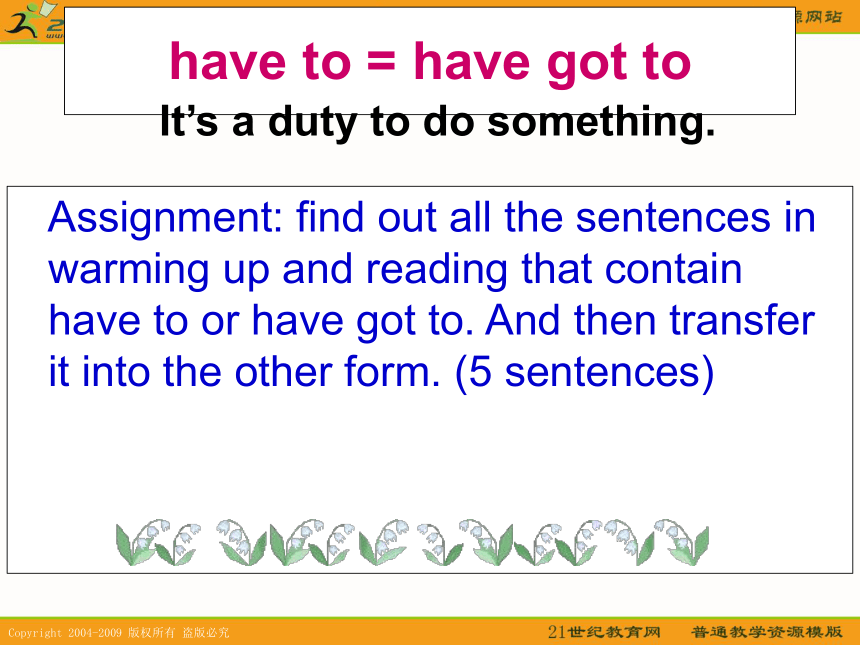
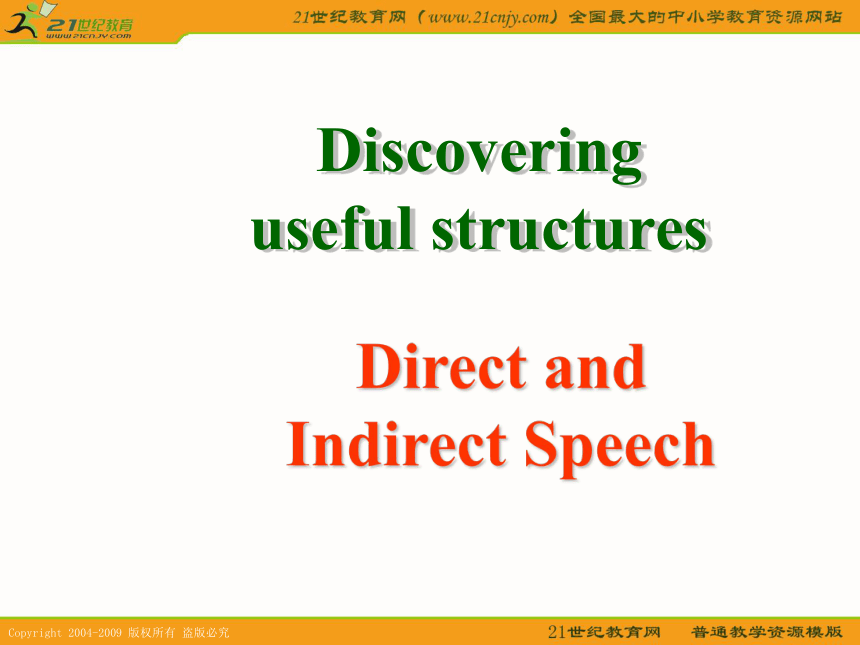
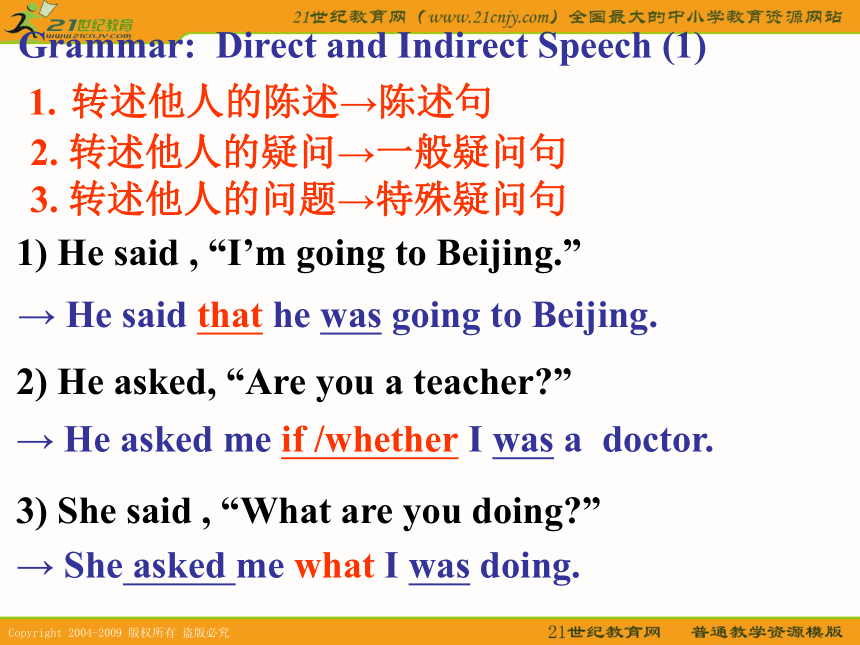
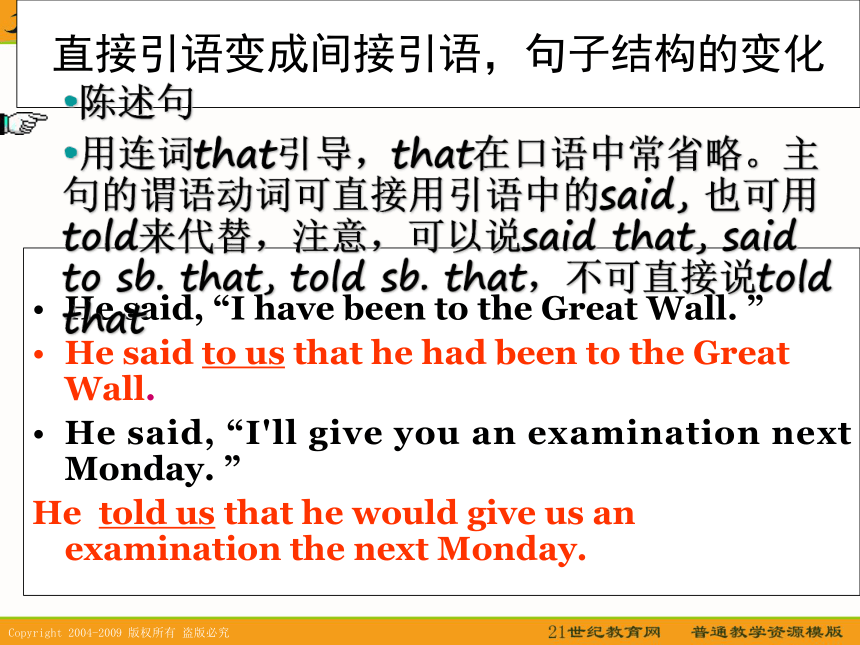
文档简介
课件29张PPT。Unit 1 FriendshipLearning about languageDiscovering useful words and expressions1. Find the word or expression for each of the following meanings from the text. ______________ not inside a building
_________ feeling disturbed
_____________________to be worried about
____________free, not tied up
_______________ to experience something
__________ to take no notice of
_____________ staying close to and looking at somebody
__________ to become quiet after nervous activity
_______________ piece of material hung to cover a window
____________ number of things that happen one after anotheroutdoorsgo throughlooseupsetignoreface to face be concerned about calm downcurtainseries2. Answer keys for Ex. 2 on page 4: Anne’s sister, Margot, was very ______ that the family had to move. However, she knew that she had to _________all the difficulties with her family. She found it difficult to settle and ___________ in the hiding place, because she was _________ whether they would be discovered. She suffered from loneliness, but she had to learn to like it there. What she really missed was going _______ walking the dog for her neighbour. It was such fun to watch it run ___ ___in the park. She wished she could tell her neighbour_________ that she was sorry not to be able to do it any longer, but she knew that was too dangerous.upset go throughoutdoorshide awaylooselyface to face concerned about 3. Answer keys for Ex.3 on page 4:When the man saw the car accident on the highway, he stopped to offer help.
“How can Linda recover from her illness in this room when it’s so dirty and dusty ? It will only make her worse.” said the doctor.
After Peter died, George set down the story of their friendship in a book.
When the street lights go on at dusk , they make a beautiful picture , so different from the daytime. 5. Good friends do not concern about what they do for each other; instead they offer help when it is needed.
Although Tim and Mike come from entirely different backgrounds, they became close friends.
Please draw the curtain ; the sunlight is too bright.
“Sorry, I didn’t break the plate on purpose .”
“ It’s OK. Don’t worry about it.” have to = have got to Assignment: find out all the sentences in warming up and reading that contain have to or have got to. And then transfer it into the other form. (5 sentences)
It’s a duty to do something.Direct and
Indirect SpeechDiscovering useful structuresGrammar: Direct and Indirect Speech (1)转述他人的陈述→陈述句→ She asked me what I was doing.1) He said , “I’m going to Beijing.”→ He said that he was going to Beijing.2) He asked, “Are you a teacher?”→ He asked me if /whether I was a doctor.3) She said , “What are you doing?”2. 转述他人的疑问→一般疑问句3. 转述他人的问题→特殊疑问句 直接引语变成间接引语,句子结构的变化
He said, “I have been to the Great Wall. ”
He said to us that he had been to the Great Wall.
He said, “I'll give you an examination next Monday. ”
He told us that he would give us an examination the next Monday. 陈述句
用连词that引导,that在口语中常省略。主句的谓语动词可直接用引语中的said, 也可用told来代替,注意,可以说said that, said to sb. that, told sb. that,不可直接说told that
解题步骤:1.陈述句:“I don’t like computers,” Sarah said to her friends.Sarah said to her friendsthat saiddidn’tsheSarah said to her friends that she didn’t like computers.Sarah一般疑问句 He said, “Do you have any difficulty with pronunciation?”
He asked (me) whether/if I had any difficulty with my pronunciation.
He said, “You are interested in English, aren't you?”
He asked whether I was interested in English. 间接引语用连词whether或if引导,原主句中谓语动词said要改为asked(me/him/us等),语序是陈述句的语序
2.一般疑问句:
Is it easy to improve the condition of the soil?
( They asked him )They asked himifIt is easy to improve the condition of the soil.it is easy to improve the condition of the soil.askediswasThey asked him if it was easy to improve the condition of the soil.特殊疑问句 He said to me,“What's your name?”
He asked me what my name was.
He asked us, “How many car factories have been built in your country?”
He asked us how many car factories had been built in our country. 原来的疑问词作为间接引语的连词,主句的谓语动词用ask(sb. )来表达,语序改为陈述句语序
3.特殊疑问句:
When do you harvest the wheat ?
( They asked him )They asked himWhenyou harvest the wheatyou harvest the wheat.heharvestedThey asked him when he harvested the wheat.选择疑问句 He asked, “Do you speak English or French?”
He asked me whether I spoke English or French.
I asked, “Will you take bus or take train?”
I asked him whether he would take bus or take train. 用whether…or…表达,而不用if…or…,也不用either…or…
5. 注意地点的变化在直接引语变为间接引语时需要注意的变化1. 注意时态的变化2. 注意人称变化。3. 注意指示代词的变化4. 注意时间的变化6. 注意个别趋向动词的变化When you change a sentence from direct speech to indirect speech, you sometimes need to change the verb tense. You may also need to change pronouns , time in order to keep the same meaning.Direct indirect
Present past
Past past and past perfect
Present perfect past perfect
Past perfect past perfectThe geography teacher told us that the sun rises in the east and sets in the west.谓语动词时态变化需要注意几点:1.直接引语表述的是客观真理,变为间接引语时,时态不变The geography teacher said, “The sun rises in the east and sets in the west.”She says that she’ll never forget the days in the country.2. 如果直接引语所表述的内容在目前和说话时同样有效,变间接引语时,时态可不变The children said, “We love this game.”They told us that they love that game.3.主句谓语动词的时态是现在时态,在引述时,时态不变。She says, “I’ll never forget the days in the country.”1. 当主句的谓语动词是将来时的时候
2. 当直接引语部分带有具体的过去时间状语时
3. 当直接引语中有以when, while引导的从句,表示过去的时间时
4. 当引语是谚语、格言时
5. 当直接引语中有情态动词should, would, could, had better, would rather, might, must, ought to, used to, need时 从句时态无须改变的还有以下情况: 直接引语 间接引语
指示代词 时 间 状 语 地点状语 方向性动词 this, that, these those
now, then, today that day
this week that week yesterday the day before
last week the week before
four days ago four days before the day before yesterday two days before
tomorrow the next day
next month the next month
here there
come, go,bring take Exercises:1. He said , “I m afraid I can’t finish this work.”2.He said , “I haven’t heard from him since May.”
3.Tom said “I will see you next week.”
He said that he was afraid he couldn’t finish that work.He said that he hadn’t heard from him since May.Tom said that he would see me the next week.4. “Why were you late again?” The teacher said to me.
5. “I don’t like swimming,” said Sarah.
6. His friends asked him if he would go to Dalian.
7. “Have you been to Paris?” My classmate asked me.The teacher asked me why I was late again.Sarah said she didn’t like swimming.His friends asked him, “Will you go to Dalian?”My classmate asked me if I had been to Paris.Readers can ________ quite well without knowing the exact meaning of each word.
A. get over B. get in
C. get along D. get through高考链接C解析:答案C。本题主要考查具体语境中get短语的用法。全句意为:尽管读者不知道每个单词的确切含义,但他们能够很好得读懂,即读书进展得顺利,故用get along。2. It’s hard for me to imagine what I would be doing today if I ______ in love, at the age of seven, with the Melinda Cox Library in my hometown.
A. wouldn’t have fallen B. had not fallen
C. should fall D. were to fall高考链接B解析:答案B。本题考查了fall in love在虚拟语气中的应用,从标志性时间状语at the age of seven看,宾语从句内容意指过去。在虚拟语气结构中,若指过去,从句中动词形式用过去完成时,主句中谓语动词形式用would/should/might/ could/have done。3. Father went to his doctor for _______ about his heart trouble.
A. an advice B. advice
C. advices D. the advices高考链接B解析:答案B。Advice若作“忠告,劝告,建议”讲,无论什么情况下都不可数,故A、C、D各项均属错误。Advice前不能用不定冠词,但可被some,much,a lot of/lots of,a piece of,a bit of,a word of等修饰。4. I wonder how he ____ that to the teacher.
A. dare to say B. dare saying
C. not dare say D. dared say高考链接D解析:答案D。本题主要考查了dare作为情态动词和实义动词的基本用法。作为实义动词,dare有人称、数和时态的变化,故dare to say与主语he相悖;dare doing结构本身错误;dare的否定形式应为dare not do(情态动词)或don’t/doesn’t/didn’t dare (实义动词) to do。 HOMEWORK1. SB P5Exx1,2
2. Go over what
we learnt today.
3. Finish USING WORDS AND EXPRESSIONS and USING STRUCTURES on page 41-43.
_________ feeling disturbed
_____________________to be worried about
____________free, not tied up
_______________ to experience something
__________ to take no notice of
_____________ staying close to and looking at somebody
__________ to become quiet after nervous activity
_______________ piece of material hung to cover a window
____________ number of things that happen one after anotheroutdoorsgo throughlooseupsetignoreface to face be concerned about calm downcurtainseries2. Answer keys for Ex. 2 on page 4: Anne’s sister, Margot, was very ______ that the family had to move. However, she knew that she had to _________all the difficulties with her family. She found it difficult to settle and ___________ in the hiding place, because she was _________ whether they would be discovered. She suffered from loneliness, but she had to learn to like it there. What she really missed was going _______ walking the dog for her neighbour. It was such fun to watch it run ___ ___in the park. She wished she could tell her neighbour_________ that she was sorry not to be able to do it any longer, but she knew that was too dangerous.upset go throughoutdoorshide awaylooselyface to face concerned about 3. Answer keys for Ex.3 on page 4:When the man saw the car accident on the highway, he stopped to offer help.
“How can Linda recover from her illness in this room when it’s so dirty and dusty ? It will only make her worse.” said the doctor.
After Peter died, George set down the story of their friendship in a book.
When the street lights go on at dusk , they make a beautiful picture , so different from the daytime. 5. Good friends do not concern about what they do for each other; instead they offer help when it is needed.
Although Tim and Mike come from entirely different backgrounds, they became close friends.
Please draw the curtain ; the sunlight is too bright.
“Sorry, I didn’t break the plate on purpose .”
“ It’s OK. Don’t worry about it.” have to = have got to Assignment: find out all the sentences in warming up and reading that contain have to or have got to. And then transfer it into the other form. (5 sentences)
It’s a duty to do something.Direct and
Indirect SpeechDiscovering useful structuresGrammar: Direct and Indirect Speech (1)转述他人的陈述→陈述句→ She asked me what I was doing.1) He said , “I’m going to Beijing.”→ He said that he was going to Beijing.2) He asked, “Are you a teacher?”→ He asked me if /whether I was a doctor.3) She said , “What are you doing?”2. 转述他人的疑问→一般疑问句3. 转述他人的问题→特殊疑问句 直接引语变成间接引语,句子结构的变化
He said, “I have been to the Great Wall. ”
He said to us that he had been to the Great Wall.
He said, “I'll give you an examination next Monday. ”
He told us that he would give us an examination the next Monday. 陈述句
用连词that引导,that在口语中常省略。主句的谓语动词可直接用引语中的said, 也可用told来代替,注意,可以说said that, said to sb. that, told sb. that,不可直接说told that
解题步骤:1.陈述句:“I don’t like computers,” Sarah said to her friends.Sarah said to her friendsthat saiddidn’tsheSarah said to her friends that she didn’t like computers.Sarah一般疑问句 He said, “Do you have any difficulty with pronunciation?”
He asked (me) whether/if I had any difficulty with my pronunciation.
He said, “You are interested in English, aren't you?”
He asked whether I was interested in English. 间接引语用连词whether或if引导,原主句中谓语动词said要改为asked(me/him/us等),语序是陈述句的语序
2.一般疑问句:
Is it easy to improve the condition of the soil?
( They asked him )They asked himifIt is easy to improve the condition of the soil.it is easy to improve the condition of the soil.askediswasThey asked him if it was easy to improve the condition of the soil.特殊疑问句 He said to me,“What's your name?”
He asked me what my name was.
He asked us, “How many car factories have been built in your country?”
He asked us how many car factories had been built in our country. 原来的疑问词作为间接引语的连词,主句的谓语动词用ask(sb. )来表达,语序改为陈述句语序
3.特殊疑问句:
When do you harvest the wheat ?
( They asked him )They asked himWhenyou harvest the wheatyou harvest the wheat.heharvestedThey asked him when he harvested the wheat.选择疑问句 He asked, “Do you speak English or French?”
He asked me whether I spoke English or French.
I asked, “Will you take bus or take train?”
I asked him whether he would take bus or take train. 用whether…or…表达,而不用if…or…,也不用either…or…
5. 注意地点的变化在直接引语变为间接引语时需要注意的变化1. 注意时态的变化2. 注意人称变化。3. 注意指示代词的变化4. 注意时间的变化6. 注意个别趋向动词的变化When you change a sentence from direct speech to indirect speech, you sometimes need to change the verb tense. You may also need to change pronouns , time in order to keep the same meaning.Direct indirect
Present past
Past past and past perfect
Present perfect past perfect
Past perfect past perfectThe geography teacher told us that the sun rises in the east and sets in the west.谓语动词时态变化需要注意几点:1.直接引语表述的是客观真理,变为间接引语时,时态不变The geography teacher said, “The sun rises in the east and sets in the west.”She says that she’ll never forget the days in the country.2. 如果直接引语所表述的内容在目前和说话时同样有效,变间接引语时,时态可不变The children said, “We love this game.”They told us that they love that game.3.主句谓语动词的时态是现在时态,在引述时,时态不变。She says, “I’ll never forget the days in the country.”1. 当主句的谓语动词是将来时的时候
2. 当直接引语部分带有具体的过去时间状语时
3. 当直接引语中有以when, while引导的从句,表示过去的时间时
4. 当引语是谚语、格言时
5. 当直接引语中有情态动词should, would, could, had better, would rather, might, must, ought to, used to, need时 从句时态无须改变的还有以下情况: 直接引语 间接引语
指示代词 时 间 状 语 地点状语 方向性动词 this, that, these those
now, then, today that day
this week that week yesterday the day before
last week the week before
four days ago four days before the day before yesterday two days before
tomorrow the next day
next month the next month
here there
come, go,bring take Exercises:1. He said , “I m afraid I can’t finish this work.”2.He said , “I haven’t heard from him since May.”
3.Tom said “I will see you next week.”
He said that he was afraid he couldn’t finish that work.He said that he hadn’t heard from him since May.Tom said that he would see me the next week.4. “Why were you late again?” The teacher said to me.
5. “I don’t like swimming,” said Sarah.
6. His friends asked him if he would go to Dalian.
7. “Have you been to Paris?” My classmate asked me.The teacher asked me why I was late again.Sarah said she didn’t like swimming.His friends asked him, “Will you go to Dalian?”My classmate asked me if I had been to Paris.Readers can ________ quite well without knowing the exact meaning of each word.
A. get over B. get in
C. get along D. get through高考链接C解析:答案C。本题主要考查具体语境中get短语的用法。全句意为:尽管读者不知道每个单词的确切含义,但他们能够很好得读懂,即读书进展得顺利,故用get along。2. It’s hard for me to imagine what I would be doing today if I ______ in love, at the age of seven, with the Melinda Cox Library in my hometown.
A. wouldn’t have fallen B. had not fallen
C. should fall D. were to fall高考链接B解析:答案B。本题考查了fall in love在虚拟语气中的应用,从标志性时间状语at the age of seven看,宾语从句内容意指过去。在虚拟语气结构中,若指过去,从句中动词形式用过去完成时,主句中谓语动词形式用would/should/might/ could/have done。3. Father went to his doctor for _______ about his heart trouble.
A. an advice B. advice
C. advices D. the advices高考链接B解析:答案B。Advice若作“忠告,劝告,建议”讲,无论什么情况下都不可数,故A、C、D各项均属错误。Advice前不能用不定冠词,但可被some,much,a lot of/lots of,a piece of,a bit of,a word of等修饰。4. I wonder how he ____ that to the teacher.
A. dare to say B. dare saying
C. not dare say D. dared say高考链接D解析:答案D。本题主要考查了dare作为情态动词和实义动词的基本用法。作为实义动词,dare有人称、数和时态的变化,故dare to say与主语he相悖;dare doing结构本身错误;dare的否定形式应为dare not do(情态动词)或don’t/doesn’t/didn’t dare (实义动词) to do。 HOMEWORK1. SB P5Exx1,2
2. Go over what
we learnt today.
3. Finish USING WORDS AND EXPRESSIONS and USING STRUCTURES on page 41-43.
